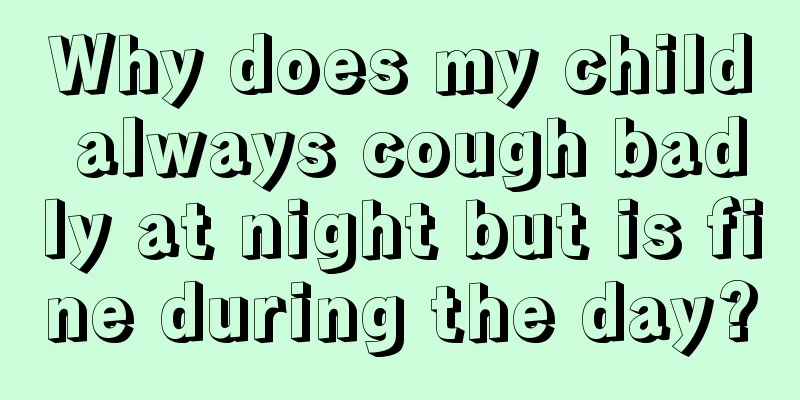What are the effects of neonatal jaundice? Will neonatal jaundice cause drowsiness?

|
Many babies will suffer from jaundice when they are just born. Jaundice can be divided into physiological and pathological types. Physiological jaundice can be cured in a few days, while pathological jaundice is more troublesome. So here we will learn about the impact of neonatal jaundice. Will neonatal jaundice cause drowsiness? What are the effects of neonatal jaundice?There are two types of neonatal jaundice, one is jaundice caused by increased indirect bilirubin, and the other is jaundice caused by increased direct bilirubin. If the indirect bilirubin is elevated, the situation is generally not serious, and it will only cause yellowing of the newborn's skin, but the newborn's mental state is good, the amount of milk intake is normal, and it will slowly subside after a few days. But if the level of direct bilirubin in the newborn's blood is elevated, it is more dangerous and may greatly threaten the health of the newborn. These direct bilirubins will pass through various barriers in the body and then enter the newborn's nervous system, posing a serious threat to neurological health. In severe cases, the newborn's vision and motor development may also be affected, and even affect intelligence. Since jaundice has such a serious harm to the physical health of newborns, mothers must pay attention to it after the newborn's body shows symptoms of jaundice. Timely monitoring of the newborn's condition is one aspect, and active treatment measures must also be taken. Will newborns with jaundice become sleepy?Neonatal jaundice is divided into physiological jaundice and pathological jaundice. Neonatal jaundice generally does not cause drowsiness. If the baby has jaundice and drowsiness, it may indicate that the baby's jaundice is more serious and there are early manifestations of bilirubin encephalopathy. Bilirubin encephalopathy refers to jaundice entering the central nervous system and depositing in the basal ganglia of the brain, causing jaundice brain damage. In the early stage, the baby usually shows drowsiness, poor reaction, poor reaction, less or no milk, or low limb tension on the basis of jaundice. Generally, after 24 hours, it enters the spasm stage, and the baby will have fever, screaming, stiff limbs, convulsions, etc. Therefore, if the baby has drowsiness symptoms in neonatal jaundice, he needs to go to the hospital for treatment immediately to prevent irreversible bilirubin brain damage. Will neonatal jaundice go away on its own?Most neonatal jaundice will disappear on its own as the newborns get older, because most neonatal jaundice is physiological jaundice. Physiological jaundice appears in full-term newborns 2-3 days after birth, reaches a peak one week after birth, and generally disappears completely two weeks after birth. For premature infants, jaundice can basically disappear completely one month after birth. Some pathological jaundice will not disappear on its own if the cause of jaundice is not removed, and there is a tendency to worsen, such as ABO hemolytic disease, Rh hemolytic disease, infectious jaundice, or some hepatocellular jaundice, such as cholestasis and congenital biliary atresia. In short, neonatal jaundice should be monitored dynamically. At present, it has developed to monitor hourly bilirubin. As long as the indications for treatment of hyperbilirubinemia are met, hospitalization must be carried out in time to exclude pathological factors. Most physiological jaundice can disappear on its own. Will newborns with jaundice have fever?Neonatal jaundice generally does not cause fever. Under what circumstances will fever occur? First of all, in view of neonatal jaundice, it may cause fever during the blue light treatment process. Another possibility is that jaundice is caused by infection, so jaundice caused by infection will cause fever. Another possibility is that the newborn's intake is insufficient, water is lost, and dehydration fever will cause fever. If the child has both jaundice and fever, we must consider whether there is an infectious disease. Often, for a more serious infectious disease, jaundice may be a major manifestation in the early stage, and then accompanied by fever. In this case, pay attention to whether there is a problem of septic meningitis. Severe infections may also be accompanied by jaundice, which will worsen again. In addition to jaundice and fever, children may also have other manifestations of infection and poisoning. In addition, when a newborn is just born, due to insufficient breast milk and no addition of formula milk, the newborn is dehydrated and lacks water. In this case, dehydration fever will also cause fever. In this way, we should give him more breast milk, suck frequently to promote the secretion of breast milk, and feed formula milk when necessary, which can reduce the occurrence of jaundice. If a fever occurs during phototherapy, we can lower the temperature of the box and replenish water. |
>>: Will neonatal jaundice affect weight gain? Do neonatal jaundice require medication?
Recommend
Is Feihe milk powder good? Introduction to Feihe milk powder
When it comes to Feihe milk powder, everyone shou...
How to use ovulation test strips_How to use ovulation test strips
When preparing for pregnancy, you need to choose ...
Will an enlarged cervix affect pregnancy?
Although cervical hypertrophy is a common gynecol...
Which kind of wood is the best for wooden combs? What are the advantages and disadvantages of wooden combs for combing hair?
As we all know, combs are a very common product i...
What is the most suitable age for babies to attend talent classes?
As social competition becomes increasingly fierce...
Which country is Crest toothpaste from? Which is better, Crest toothpaste or Sensodyne?
Crest toothpaste is a brand we are all familiar w...
Can an 8-month-old baby drink honey water? Is it okay to give candy to a crying baby?
Sweet taste is the favorite of many children, but...
Dosage and Usage of Lifeline Care Children's Vitamins How to take Norwegian Lifeline Care vitamins?
How to take Norwegian Lifeline Care vitamins? Bab...
Can I eat durian during confinement? How to eat durian during confinement?
Women are weak during the confinement period, so ...
How many months can babies eat pureed meat? At what age can babies start eating meat?
When to start adding complementary food to babies...
Why is Shuke toothpaste expensive? Which Shuke toothpaste is the best?
The actual user experience of Shuke toothpaste is...
At what age does a child enter the rebellious period? How should a child be guided during the rebellious period?
The rebellious period has become an indispensable...
What should I do if my breasts hurt during milk flow? What should I do if my breasts hurt during milk flow?
What to do if you feel pain during milk letdown? ...
Can babies eat crayfish? At what age can babies eat crayfish?
Summer is here, and it is the season for eating l...
When is a caesarean section necessary? The most comprehensive knowledge on caesarean section
Comparing the recovery speed of natural birth and...









